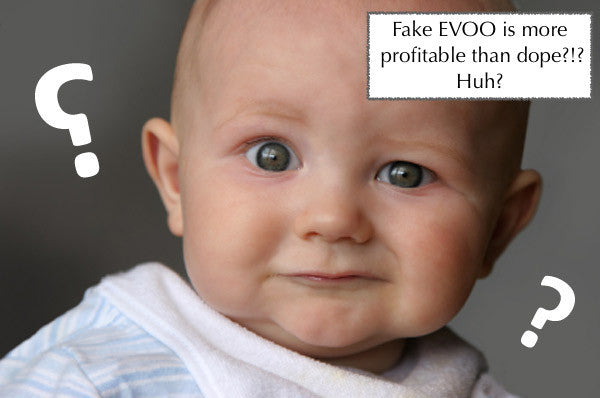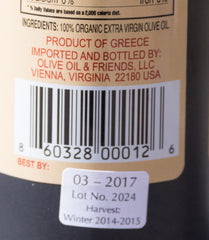
Fake Olive Oil is Not a Victimless Crime
Share
Earlier this week, 60 Minutes featured a story on the "Agromafia", an Italian term for organized crime related to food. Among other items, the story focused heavily on adulterated extra virgin olive oil. As several of the experts and commentators noted in the piece, the adulteration of olive oil has been going on for many years. So, if this is nothing new, why all the fuss now?
The reality is that the extra virgin olive oil industry is very immature. Although olive oil has been produced for food consumption for at least 2,000 years, we are still learning about the best ways to produce, preserve, and consume extra virgin olive oil. Until recently, there hasn't been much information available to consumers about how to choose an olive oil. Although many grocery stores may have dozens of varieties of oil on their shelves, very rarely will anyone be able to tell you about the differences among them. Ask about the various wine offerings, though, and you'll get plenty of guidance.
This information vacuum has been perpetuated and exploited in the U.S. by large olive oil companies. Everything, right down to the naming conventions for olive oil, has been manipulated to ensure market share is maintained and profit maximized. The 60 Minutes piece shows just how easy it is to, as they say, "produce a genuine fake olive oil". And, as noted, up to 80% of the extra virgin olive oil on store shelves in the US is fake.

Although Italy produces some fantastic olive oil (I joke with my Italian in-laws that the trees were put there by Greeks), the fact is that Italy is a net-importer of olive oil. That is, they consume more than they produce, even in a good year. As a result, much of the good quality oil is consumed in-country, while the lower-grade oil is blended with even lower-grade products and exported. In fact, if you find a good quality Italian oil in the U.S., it is likely that the oil in the bottle is Greek.
The issue of olive oil adulteration has long been viewed as a "victimless crime", with enforcement extremely rare. As the recent scandals and busts in Italy indicate, the issue is gaining some attention. Authorities have a tough road, though, since the profits in selling fake olive oil exceed those of illicit drugs.

As producers of authentic extra virgin olive oil, we can state with certainty that this is not a victimless crime at all. The health benefits of olive oil are widely known, but these benefits are for extra virgin olive oil. Buying a lower grade olive oil is little better than buying generic vegetable oil. Consumers have been conditioned for years to buy a bottle of extra virgin olive oil for $8 or $9 and have become accustomed to the cost (and taste). Although these are almost certainly fakes, convincing consumers that a true extra virgin olive oil may cost two or three times that amount takes time and effort (and some taste tests). We can attest that $9 for a bottle barely covers the cost of production and importing. Consumers and honest producers alike are impacted by olive oil fraud.
So, what is the lesson to be taken from this most recent national story on olive oil? Eliminate some of that information gap by learning to look at the back of the bottle. You should be able to easily determine the source of the oil and the harvest date. If those two items are missing, obscured, or confusing, there's probably a reason. Good producers have nothing to hide, which is why we post our annual chemical analysis reports right here on our blog.

Let us know if this was helpful. We're very much committed to helping consumers get the information they need to purchase quality extra virgin olive oil. Feel free to contact us any time with questions.
